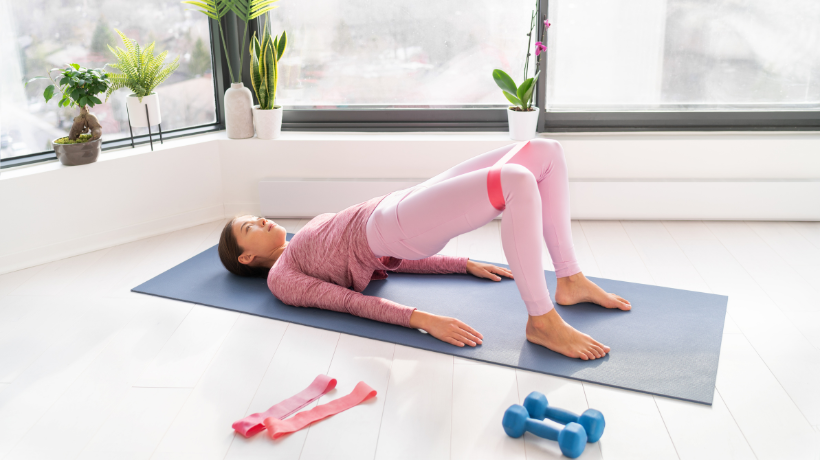Why Weak Hips Might Be Messing With Your Pelvic Floor (and What to Do About It)

If you've been doing Kegels forever and still feel like your pelvic floor just isn't cooperating, the missing link might be a bit further out…that's right, your hips.
Yep, those glutes, rotators, and deep stabilizers that get all the attention in workouts play a pretty big role in pelvic floor health. It's not something most people think about unless they’ve spent time in a physical therapy clinic—but weak hip muscles can absolutely affect how well your pelvic floor functions. And if you're dealing with things like urinary leakage, low back pain, or pelvic heaviness, it's worth taking a closer look at how your hips are functioning.
The Pelvic Floor Is a Team Player
Let’s start with the basics. Your pelvic floor is a group of muscles at the bottom of your pelvis that supports your bladder, bowel, and (for people with uteruses) your uterus. These muscles help control continence, stabilize the core, and contribute to sexual function.
But here’s the thing: they don’t work alone. The pelvic floor is part of a team—along with your diaphragm, abdominal muscles, and as we talked about earlier, your hips. When one part of that team is slacking, the others must pick up the slack.
So, What Do Hips Have to Do With It?
Your hips, especially the gluteus medius, gluteus maximus, and deep rotators (like the obturator internus), help stabilize your pelvis and support good alignment. When these muscles are weak or not firing properly, your posture shifts, and your pelvic floor can end up in a compromised position—either overstretched or overactive.
Think of it this way: if the scaffolding around a building is shaky, the structure inside must work overtime just to stay upright. Over time, that can lead to strain, fatigue, and dysfunction.
Some research even shows that people with pelvic floor disorders often have weaker hip muscles. For example, women with stress urinary incontinence tend to have weaker hip abductors and external rotators than women without it.
Signs Your Hips Might Be Part of the Problem
You might have hip weakness contributing to pelvic floor issues if:
- You have poor balance or feel unsteady on one leg
- You notice your knees caving in during squats or lunges
- You have ongoing lower back or sacroiliac (SI) joint pain
- You've tried pelvic floor exercises but haven’t seen much improvement
Also, if you’re postpartum, it’s common to lose strength in both your core and hips—which is why many new moms benefit from full-body rehab, not just Kegels.
What You Can Do About It
The good news? Strengthening your hips isn’t complicated, and it can make a big difference. Here are a few ways to start:
- Clamshells: Lie on your side, with your knees bent, and open your top knee like a clamshell while keeping your feet together. Don’t let your hips roll backward. You’ll feel this in your glutes.
- Side-lying leg lifts: Lie on your side with your top leg straight and bottom knee bent for stability, lift your top leg straight up to target the glute medius. Again, don’t let your hips roll backward during this exercise.
- Bridges: Lying on your back with knees bent, lift your hips off the floor while squeezing your glutes.
- Monster walks with a resistance band: Great for activating those smaller hip stabilizers.
And if you're dealing with pelvic floor symptoms, working with a pelvic floor physical therapist is a game changer. They can assess both your pelvic floor and your hip strength—and help you figure out what your body needs.
Final Thoughts
Your pelvic floor might be the star of the show when it comes to things like bladder control and core stability, but your hips are playing a big supporting role. Ignoring them can keep you stuck in a frustrating cycle of symptoms that just won't go away.
If you’ve been focusing on only Kegels and wondering why you’re not getting results, it might be time to look a little higher up the chain. Your hips might be the missing piece of the puzzle.
Do you still have questions or want to find a Pelvic Health Physical Therapist near you? The Academy of Pelvic Health’s PT Locator: PT Locator | Find Expert Care for Pelvic and Abdominal Health - APTA Pelvic Health can help you get the care you need today!

Author: Sara Denton PT, DPT, Certificate of Advanced Practice in Physical Therapy in Pelvic Health
Author Bio: Sara lives and works in the Northern Chicago suburbs, practicing in an outpatient setting. She works primarily with patients of all genders with pelvic floor dysfunction. Sara is the Illinois State Representative for the Academy of Pelvic Health and is also on the Health and Wellness Committee for the Academy.


